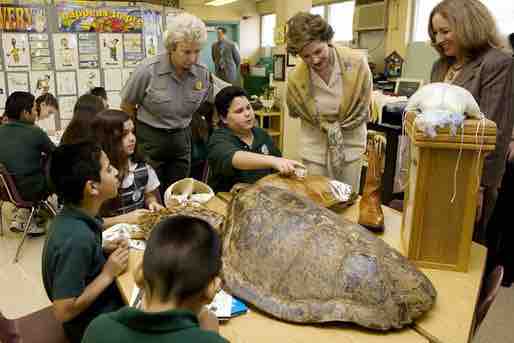Though gifted education programs are widespread, there is no standard definition of "gifted," nor a standard way of implementing gifted education. Gifted education programs are justified by a two-pronged argument: First, gifted and talented youth are not adequately challenged by the standard curriculum and therefore require accelerated curricula or enrichment activities to reach their full potential. Second, gifted and talented youth are inherently at-risk.
This second argument may seem counter-intuitive, but it has gained general credibility. This argument was formally articulated by the 1972 Marland Report by then U.S. Commissioner of Education S. P. Marland. According to the report, gifted youth are more likely than average to experience academic failure and to develop social and emotional problems. Gifted students may experience social rejection and difficulty making friends, as well as grapple with fear of failure and perfectionism. They may intentionally play down their abilities in order to make friends. They are also more prone to depression, anxiety and disengagement, as well as to behavior problems and drug and alcohol abuse. This may be in part due to a need for stimulation beyond what they receive in a typical classroom.
Since the early 20th century, definitions of "gifted" have been based on IQ, or intelligence quotient. Different schools may set different cut-offs for defining giftedness, but a common standard is the top 2% of students with an IQ score of about 140 or above. More general definitions of giftedness may also evaluate students' capability in areas like intellectual, creative, artistic, or leadership capacity, or in specific academic fields. Evaluations may be based on portfolios of student work, classroom observations, and achievement measures.
The 2002 No Child Left Behind law shifted attention away from gifted students. The law aims to bring proficiency of all students to grade level, but critics note it does not address the needs of gifted students who perform above grade level. The act imposes punishments on schools, administrators and teachers when students do not achieve to the plan's designs, but does not address any achievement standards for high functioning students. This forces schools and teachers to spend their time with low achieving students. As a result of this law, many fear, gifted services have been eroding
Forms of Gifted Education
Gifted education programs take many forms, including a combination of acceleration, pull-out or cluster grouping, and enrichment activities . Acceleration programs may compact curriculum or allow students to self-pace. In compacting, students are pre-tested to determine which skills or content they have already mastered, thus allowing students to skip repetitive practice. This reduces boredom and frees time to work on more challenging material. In self-pacing, students advance at their own speeds. In general, acceleration programs advance students to higher-level material suited to their abilities and preparedness - students may skip grades, skip ahead in particular subjects, or enroll at local community colleges.

Gifted Class
Laura Bush listens to a student talk about sea turtles during a 2006 visit to Banyan Elementary School in Miami, FL, in support of education about parks and the environment.
An alternative to acceleration is pull-out or cluster grouping, in which gifted students are removed from regular classrooms. In pull-out programs, gifted students spend most of the school day with a regular classroom of mixed abilities, but may be pulled out for an hour or part of a day to practice critical thinking drills, creative exercises, or subjects not introduced in standard curriculums. Pull-out programs are generally ineffective at promoting academic achievement since they do not align with the regular curriculum.
Finally, summer enrichment presents gifted students with extra material above and beyond the standard curriculum. Students spend school days with a regular classroom, but also complete enrichment activities given as a modified assignment by the regular classroom teacher. These could include formal programs like Odyssey of the Mind or academic competitions like National History Day. Summer enrichment programs typically operate like summer camps, as students pay a fee to attend and may enroll in programs that typically focus on one subject. In any case, enrichment work is done in addition to regular school work.
Controversy
Controversies concerning gifted education are varied and often highly politicized. They are as basic as agreeing upon the appropriateness of the term "gifted" or the definition of "giftedness. " For example, does "giftedness" refer to performance or potential? Many students do not exhibit both at the same time. Measures of general intelligence also remain controversial. Early IQ tests were notorious for producing higher IQ scores for privileged races and classes and lower scores for disadvantaged subgroups. Although IQ tests have changed substantially over the past half century, and many objections to the early tests have been addressed by "culture neutral," IQ testing remains controversial.

Illinois Mathematics and Science Academy
Schools like the Illinois Mathematics and Science Academy cater to the needs of gifted students.